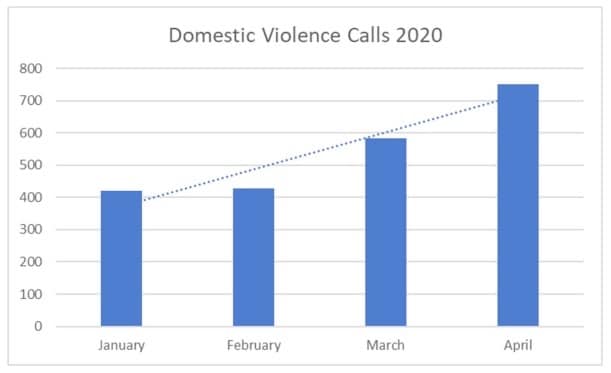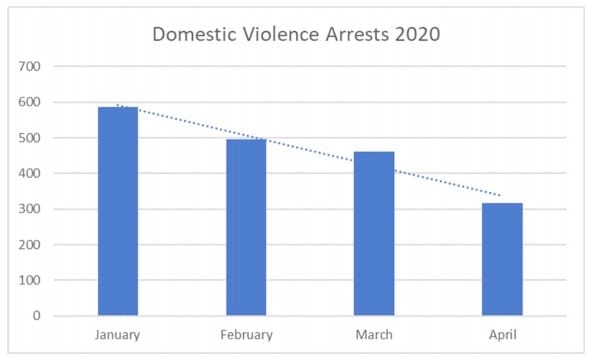Why are domestic violence 911 calls going up but domestic violence arrests going down?
“People, victims who are injured could not be going to the hospitals because they’re afraid to catch COVID for injuries where the hospital might call the police department so those arrests could be down.“ Janine Weisman: The number of 911 calls for domestic violence related incidents in Rhode Island has soared this year as the COVID-19 pandemic dramatically restricted people
May 29, 2020, 11:52 am
By Janine Weisman
“People, victims who are injured could not be going to the hospitals because they’re afraid to catch COVID for injuries where the hospital might call the police department so those arrests could be down.“
Janine Weisman: The number of 911 calls for domestic violence related incidents in Rhode Island has soared this year as the COVID-19 pandemic dramatically restricted people to their homes.
But the number of domestic violence arrests is going in the opposite direction, according to new data compiled by the Rhode Island State Police.
That is taking officials by surprise because, well, shouldn’t arrests go up if there are more calls to the police?
You can listen to the interview here:
See also: R.I. Coalition Against Domestic Violence sees continued spike in demand for services
Corporal Heather Palumbo: We’ve had this same conversation here as well.
Weisman: That’s Corporal Heather Palumbo of the Rhode Island State Police Major Crimes Unit.
Palumbo: Let’s say it certainly, I think, it made us stop and think certainly. What does this mean? So there could be a lot of reasons why the arrest numbers are down.
Weisman: For one thing, Palumbo says the officers responding to a 911 call might not find probable cause that anyone’s broken the law.
Palumbo: Are there cases where someone’s dispatched out and it’s verbal in nature and no crime has occurred? Sure. In which case an arrest would not occur. So it’s a little difficult to uh to just use only 911 calls to determine how many arrests there are going to be.
Weisman: Let’s look at the numbers. In both January and February, there were more domestic violence arrests than 911 domestic calls. January saw 420 911 calls and 587 arrests. The shorter month of February had 428 calls and 496 arrests.
Then in March, there were 584 911 domestic violence calls but only 461 domestic violence arrests.

What happened in April? The number of 911 calls kept climbing to 752 while the number or arrests kept going down to only 316.

The data for arrests includes both felonies and misdemeanors collected from court arraignment information for all jurisdictions in the state of Rhode Island.
On March 28th, Governor Gina Raimondo signed the stay at home executive order requiring all Rhode Island residents to stay home unless traveling to work or for medical treatment or obtaining food, medicine, gas, or other necessities.
All this social distancing to reduce the spread of COVID-19 has increased isolation for victims of domestic violence.
Palumbo: A lot of arrests occur from delayed reporting. You know, someone’s assaulted on a Friday night and they don’t see say a friend or a family member until Sunday, they see the black eye, they take them into the police department so sometimes a domestic arrest occurs not from a 911 call what I’m trying to say and those could be why the number are down because people aren’t seeing friends and family.
Weisman: COVID-19 has also reduced the number of encounters between members of the public and law enforcement.
Palumbo: You know just talking about what’s going on in society right now, you know there’s less proactive police work occurring because of COVID so I know like there’s a lot less car stops, there’s a lot less travel on the road so your- again this is speculation so like your rolling domestic numbers arrests could be down. Or I know like troopers on the road will run into like a no contact order violation – two people in the same car – those numbers could be down.
Weisman: Another factor, people are less likely to seek medical treatment in hospital emergency rooms out of fear of being infected with COVID-19.
Palumbo: People, victims who are injured could not be going to the hospitals because they’re afraid to catch COVID for injuries where the hospital might call the police department so those arrests could be down.
Weisman: Finally, there’s the language in Rhode Island’s domestic violence statute which applies to crimes committed by one family or household member against another.
Here’s Palumbo reading the legal definition of “Family or household member.”
Palumbo: It’s going to be spouse, or former spouse, adult persons related by blood or marriage, adult persons who are presently residing together or who have resided together in the past three years, and persons who have a child in common regardless of whether or not they have been married or lived together or persons who have been in a substantive dating relationship.
It says adult persons related by blood or marriage. So believe it or not if an adult mom assaults her juvenile child it’s not a domestic. I don’t know it’s just how the law is written. …It’s a little tricky. There’s quite a bit of training that goes into iit for law enforcement.
Weisman: So that’s the story from Rhode Island State Police Corporal Heather Palumbo on why a rise in 911 domestic violence-related calls this spring has not resulted in a corresponding rise in domestic violence arrests.
But calls to domestic violence helplines are up. The Rhode Island Coalition Against Domestic Violence and its member agencies reported a 40 percent increase in helpline/hotline calls in April. That’s compared to April 2019.
The pandemic has slowed data collection by the courts system. So law enforcement and domestic violence advocates don’t yet have a full picture of the impact of COVID-19.
Palumbo: I think in time we will because the state uses it’s called a DD domestic violence sexual reporting form so every time police respond to a domestic investigation they fill out this form and those get sent to an office with the courts and all that data is compiled. On that form is who called the police. Was it a victim? Was it a family member? Was it 911? So that data is collected but at the moment they’re not collecting the forms because of COVID. So they’re having the police departments kind of hang onto them. It’s going to take some time to get that data compiled.
Weisman: So thank you Rhode Island State Police Corporal Heather Palumbo for sharing insight on how to look at the numbers.
Palumbo: You’re welcome.
Weisman: If you are in an abusive relationship or know someone who might be, or if you are looking for resources for a child who has witnessed domestic violence, call the Rhode Island statewide Helpline for 24-hour support and information. The number is 1-800-494-8100.
I’m Janine Weisman. Thank you for listening.






